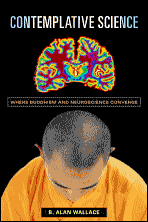Book review: Contemplative Science
 Contemplative Science: Where Buddhism and Neuroscience Converge is B. Alan Wallace’s new book. It’s packed full of challenging insights.
Contemplative Science: Where Buddhism and Neuroscience Converge is B. Alan Wallace’s new book. It’s packed full of challenging insights.
For instance, I hadn’t realized that:
- It was scientific materialism that was responsible for the death of millions of people under Hitler, Mao and Stalin.
- Scientists, the majority of whom are materialists and reductionists, adamantly refuse to consider the life of the mind. (The broad-ranging field of psychology apparently doesn’t count. Anyway, a lot of psychologists used to be behavioralists a long time ago.)
- Scientists don’t know the first thing about reality because they don’t even know what consciousness is. (Just like medieval scientists also could not explain “vapors” and “humors” and the “ether”.)
- Scientific materialism strips our lives of meaning.
- It also removes our free will. (And that’s one thing I insist on having.)
- It undermines our sense of moral responsibility.
- The more progress is made in physics, the more it proves we don’t know anything at all.
- The fact that this scientific materialism stuff just doesn’t cut it is proved by the 80% of Americans that believe in ghosts and virgin births.
- Voters supported Bush in 2004 because of his moral values, and not Kerry because he appeared to “stand for so little”.
- But still, we need to find a “fresh, integrative perspective” to reconcile these two “traditions”, even though “scientific materialism is a modern kind of nature religion or neoanimism, whic had innumerable precedents int he preliterate history of humanity”.
- The First Amendment’s establishment clause has been interpreted in an overly broad way by generations of judges.
And all that’s only from one chapter. Maybe elsewhere in the book there’s some good stuff about Buddhism, since that’s in the book’s subtitle? Sorry. We find nothing more than a mind-numbing, academic analysis of Tibetan Buddhist cosmology, that has nothing to do with neuroscience or science of any kind. (This chapter, like most (all?) of the others, apparently was cut-and-pasted from some earlier publication to fill out page count.) Maybe we’ll find out something about Zen and neuroscience? Sorry. Zen is not mentioned in the book once. Maybe we’ll learn about lots of neuroscientific research into meditation? Sorry. Wallace barely mentions the names of leading researchers and doesn’t even bother to summarize their results. Richard Davidson appears just once, in a parenthetical reference claiming that his work “shows that the idol of the brain has been toppled by empirical evidence.” Crick and Koch are brought up only to blithely accuse them of reducing consciousness to whatever science has the abililty to study, even as Wallace claims that scientists refuse to study consciousness. Perhaps we will learn about scientific theories of reincarnation memories? Sorry. We’re left with a couple of references to studies of kids who remembered past lives.
There is much that is simply stupid in this book, repetitive, superficial, or irrelevant. What is not stupid is basically wrong or at best wildly misinformed. Overall, one gets the impression that Wallace would rather be living in medieval Tibet than 21st century America; back then, there were no evil scientists and no pesky walls between the secular and spiritual.
